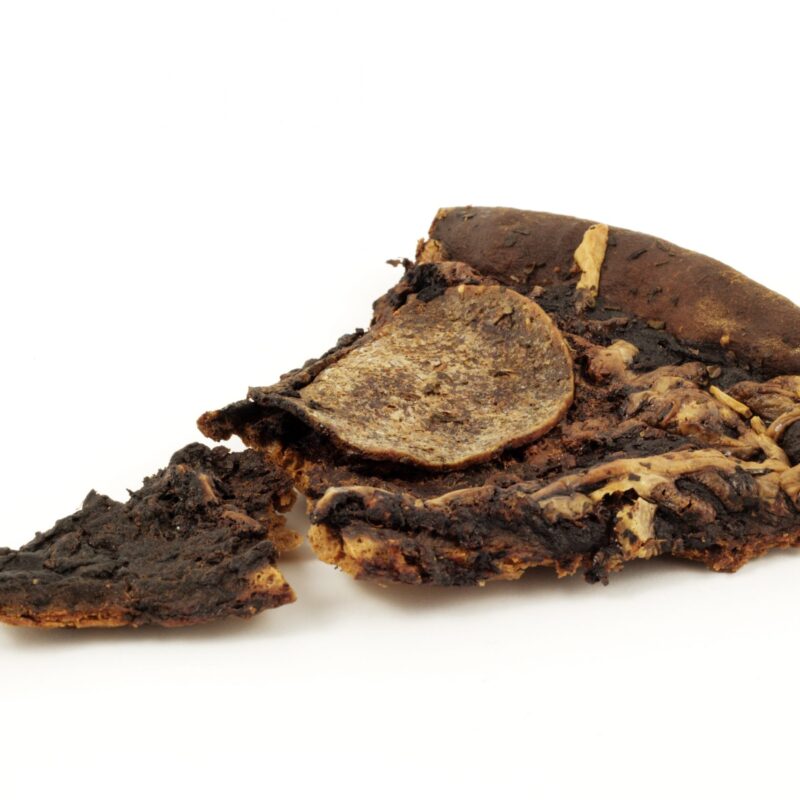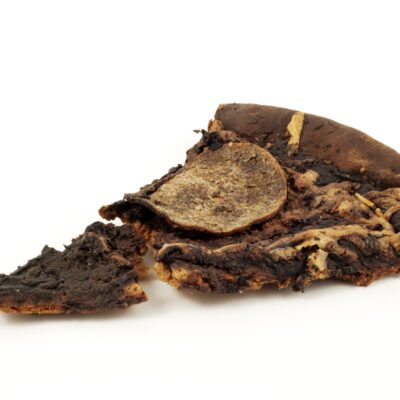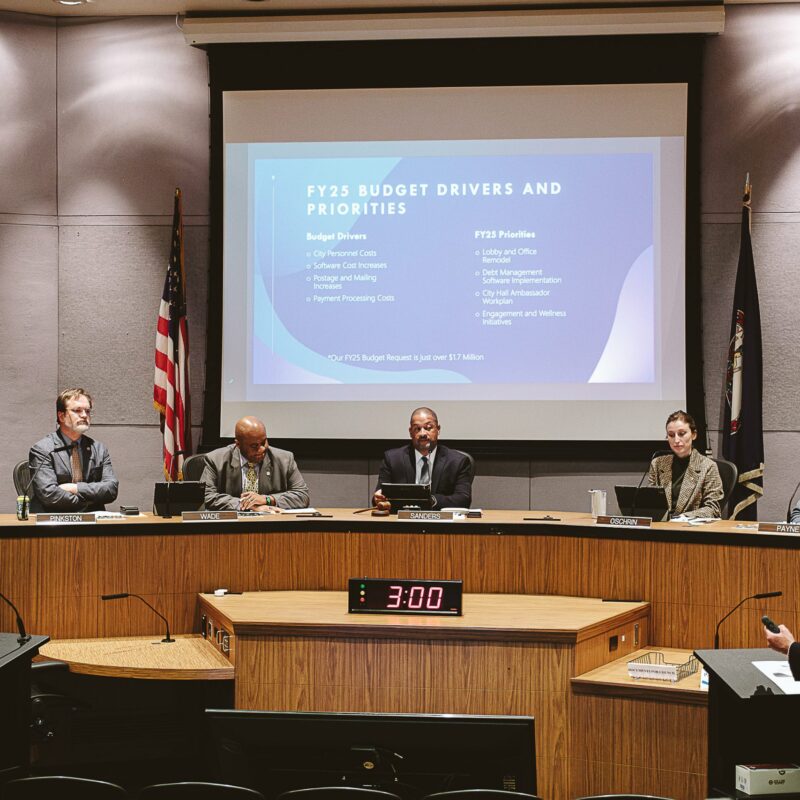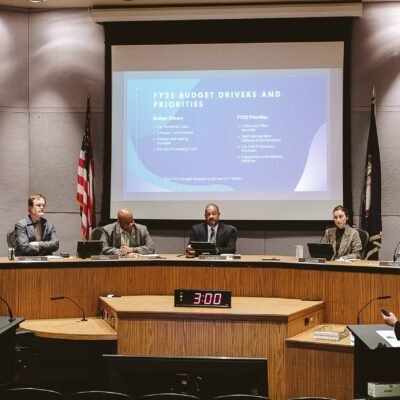Again and again in the national debate over UVA’s handling of campus sexual assault that followed Rolling Stone’s explosive and discredited story about an alleged gang rape, news outlets—including this one—have stated that the University has never expelled a student over accusations of sexual misconduct. That, it turns out, isn’t true, but you have to go back 60 years for the details.
What happened in an East Lawn room on the weekend of April 3, 1954 was not called rape at the time, or even assault. Newspaper stories called it a “sex scandal.” In Board of Visitors meeting minutes, it was referred to as “the disgraceful and deplorable incident” or just “the East Lawn incident.” The criticisms leveled at the administration for its handling of the disciplinary process that followed and the notoriety heaped on the University as a result are strikingly similar to the current crisis.
Minutes from a May 26 Board of Visitors meeting, an appeal hearing for some of the students disciplined for their role in the incident, reveals little of what actually happened; the testimonies of those involved and the administrator who investigated are largely excluded. But they do provide an outline based on statements from Richard R. Fletcher, UVA’s director of student affairs, who investigated the incident:
It was a party night, and after the fraternities had closed around 1am, a group of men gathered in 14 East Lawn, the room of Robert P. Martin, Jr., a fourth-year. He had brought his date for the night there—a violation of housing rules—but took her home around 1:45am when others showed up. Among the men was William R. Walker, a 24-year-old Army vet who had finished his undergraduate classes in February, and he had a date with him, a 19-year-old woman described as “a guest of the University.” What followed was “a disreputable party,” one that lasted into Sunday. Ultimately 12 men were involved, and the party spilled over into an adjacent room. Walker then “abandoned” the woman in the Lawn room.
The next day, her parents showed up at UVA.
“On Monday afternoon, April 6th, Mr. and Mrs. W— came to see me,” said UVA’s president at the time, Colgate W. Darden, Jr., in the BOV meeting, according to the minutes. “They were almost beside themselves with grief over their daughter. Facing them was about the worst thing in my experience. The girl had come home that day in a dazed condition, apparently beaten and brutalized, covered with bruises.”
Writing about the incident years later in his critically acclaimed nonfiction book The Hairstons, local historian Henry Wiencek referred to what happened as a rape, and said the woman was from a prominent family “well known” to Darden.
On Tuesday, according to the Board of Visitors notes, Darden met with Martin and his two friends, fellow fourth-years, Richmond natives and Lawn neighbors E. Armistead Talman and Frederic Scott Bocock. Darden then asked Fletcher to investigate.
Reaction was swift. According to meeting minutes, Darden handed out varying punishments to all 12 men in the weeks that followed, including expulsions for Walker, who hadn’t yet received his degree, and a student named W.W. Archer III. Others were given suspensions. The Board agreed to hear appeals from Walker, Archer and the three Lawn residents who had approached the president April 6 and believed their suspensions, which would delay their pending graduations, were unfair.
The whole thing might have been quietly resolved had it not been for a controversial May 19 editorial penned by Frank M. Slayton, the editor-in-chief of the Cavalier Daily. As later letters run in the paper showed, students were angry over Fletcher’s role, and believed the administrator got some of the men to confess under a false promise of immunity. Others felt the punishments were too harsh.
But Slayton stood up for the administrators and claimed the families of several well-connected students were trying to influence the appeal.
Slayton’s view was clear: “If under the same circumstances men with no powerful political connections had been dismissed, they would have left the university quietly,” he wrote.
The editorial prompted an explosion of student rage that made its way into the paper in rebuttal letters that kept coming for weeks, with a smattering of supportive nods mixed in.
One of those letters to the editor was penned by Martin, Talman and Bocock. They defended their appeal and said they were “charged only with a failure to put a halt to the actions of others.”
“All we ask and all we have ever asked is that we be judged squarely on the basis of what we have done,” their letter said.
By the appeal hearing on May 26, the scandal was national news, with stories showing up in dailies as far away as Pennsylvania and Indiana. The hearing saw testimony from students, lawyers, parents, even clergy, and more details of Fletcher’s investigation came to light and made it into the meeting minutes: Martin and Talman were present for much of the party, and Talman “spent time alone with the girl under discreditable circumstances,” according to the Board minutes. Bocock was called “the least of the offenders”; he merely gave up his room for the party, Fletcher said, and did not stop it from going on.
Ultimately, the appeal efforts failed. The expulsions of Archer and Walker were upheld at the end of the meeting, Board minutes show, and so were the suspensions of Martin, Talman and Bocock, though their punishments were modified so that their pending military commissions wouldn’t be delayed.
“Nothing that has happened during my seven years at the University has caused me the distress which the happenings of the weekend of April 3 and 4 have caused me,” reads a statement by Darden published in the Cavalier Daily after the appeals were rejected. “The penalties which I felt compelled to impose have borne on me as heavily as on the unfortunate young men who became enmeshed, either directly or indirectly, in this affair. And I know of the anguish and despair which the family, whose daughter, as a visitor, was involved. Certainly they have not been absent from my thoughts and my deepest sympathy goes out to them.
“I cannot escape the conclusion that the University itself must bear some of the blame for what has occurred,” his statement continues. “We have failed, for what reason I do not know, to build a society here that furnishes safeguards that parents have a right to expect, for children who are students here or who visit here. But nothing can be gained by brooding over the past. The task is a bitter and unrewarding one. The important thing is to decide what must be done for the future and then to turn our attention and our energies to doing it.”
There was fallout on Grounds and beyond. University men had already been pushing back against an administration they felt was dealing with them too strictly, and the same week as the hearing, several student leaders organized a massive rally at Old Cabell Hall to protest what they saw as threats to their freedom, including hinted-at crackdowns on fraternity parties. The administration’s response to the sex scandal was the “kindling” that sparked the firestorm, according to a speech made by one student and printed in the Cavalier Daily. But the semester was nearly done, and there’s little indication that the uproar changed University policy.
Now-professor emeritus David Weiss was a newly appointed member of the drama faculty at UVA the following fall, and remembers friends expressing shock over the summer that he was headed to the University.
“It had been such a hot story in the national magazines,” Weiss said. “People I knew as I came across the country had read about it when it happened. Everyone I spoke to said, ‘You’re going to Virginia? Don’t you know what happened?’” But at UVA, the issue was considered over. “I mentioned it to people I was working with, and their attitude was, ‘It happened. It was dismissed. It’s come and gone,’” said Weiss. “So it was not a topic of discussion at all.”
C-VILLE could not locate contact information for Walker or Archer.
Martin, Talman and Bocock ultimately got their degrees. Martin went on to get an MBA from UVA, and Talman graduated from the University’s medical school. All kept up connections to their alma mater, despite the turmoil that engulfed the last weeks of their undergraduate careers. Martin is listed as a 2011 member of the Hickory Club, which honors “alumni who have given consistently each year to Darden for a minimum of three years”; a Darden newsletter from 2012 indicates he died that year, but C-VILLE was unable to find contact information for his family. Talman is listed as a member of the managing board of UVA’s alumni magazine in its summer 2009 issue. He did not return a message left at his home. Bocock, the only named student involved in the incident whose family C-VILLE was able to reach, was revealed to have been a member of the ultra-elite Seven Society when he died in 2008. His family members declined to comment.
C-VILLE asked UVA spokesman Anthony de Bruyn whether the current UVA administration was aware of the 1954 incident, but did not receive a reply.





